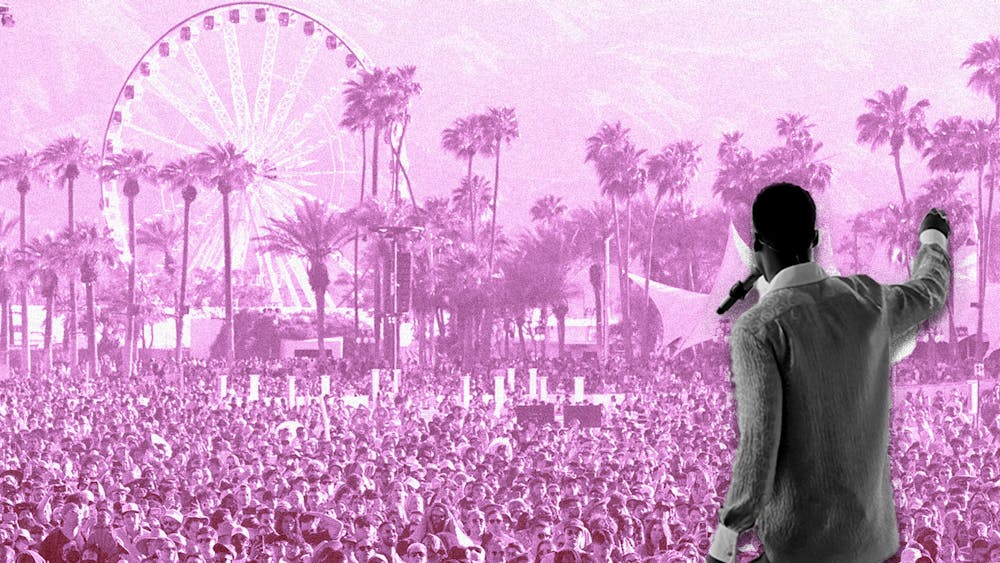Pumpkin spice lattes, flannels, ombre highlights, Shane Dawson, Tana Mongeau, Drake, BuzzFeed Quizzes, and, of course, Coachella—only a few of the phrases that may be found in a time capsule of early–to–mid 2010s pop culture. If Drake was the King of Culture, and Beyoncé or Taylor Swift the Queen, then Coachella was pop culture’s palace, an event that took over social media and was attended by both up–and–coming influencers and YouTubers and traditional A–list celebrities. Coachella always seemed to be as undeniable of a cultural event as the Met Gala, and yet, this year’s Coachella seems like a non–event, suggesting that perhaps the 2010s are truly over.
The first Coachella festival was held in 1999 and drew in music superstars throughout the beginning of the twenty–first century, including Madonna, Prince, Paul McCartney, Daft Punk, Jay–Z, and the Red Hot Chili Peppers. Coachella had been selling out its tickets since 2004, but it gained a new peak of cultural popularity and importance in the 2010s as it coincided with the rise of social media, specifically Instagram.
In 2013, a deal was made to keep the Coachella festival in Indio through 2030, a huge long–term investment for the city and proof of the festival’s strength at that time. Time commented on the music festival boom in 2019, observing how festivals like Coachella established themselves as cultural brands and “[allow] people to signal that they’re a part of major cultural moments, as the ability to attend a music festival (and broadcast one’s experience on social media) has become an experience that many covet.”
This idea was then translated into thousands of social media posts by people in their best “Coachella looks” throughout the 2010s. The idea of a “Coachella outfit" is as crystallized of a vision in Millennials’ and Gen Z’s minds as the idea of a “Madonna outfit” is to Gen X: It’s a distinct look that is linked to the cultural zeitgeist.
Celebrities such as Vanessa Hudgens—the internet’s anointed Coachella queen, who, despite not attending the festival this year, still has articles being published about her looks—walked through Coachella Valley in their best Coachella Chic looks alongside burgeoning Internet celebrities, many of whom revealed their looks in YouTube videos and vlogged their experiences. Internet personality Emma Chamberlain's 2018 Coachella video has 15M views on YouTube. It attracted eyes from every corner of popular culture and became a centric force, few of which exist anymore in the modern pop culture landscape.
However, this year, Coachella seems much more muted. Hudgens’ aforementioned absence from the festival is a big loss, especially on the fashion front, and some of the other big names in attendance, like Hailey Bieber and Kendall Jenner, have been sported wearing simple outfits, such as Jenner’s monochromatic black tank and khakis and Bieber’s white bra top and denim jeans—hardly the over–the–top, custom looks that people like James Charles were churning out only a few years ago.
Some may see these outfits as lazy and lacking effort, especially for Jenner who is a high–fashion model and Bieber who has been claimed by Gen Z as a “fashion icon.” Others may see these looks as just normal musical festival or concert attire. Perhaps the days of Coachella being an alternate Met Gala are over, and celebrities are going just to have a good time instead of to pose for Instagram pictures. Don’t influencers and celebrities now use any occasion as a photoshoot opportunity? Why wait for Coachella when any backyard can serve as the backdrop for a photo with over a million likes?
There have also been issues at the festival, namely headliner Frank Ocean’s reportedly lackluster performance. Despite Justin Bieber’s protests, most fans seemed incredibly disappointed in Ocean’s set, which was his first live performance in several years. Many TikToks of the performance have been posted, several showing Ocean cutting the music to one of his songs and walking offstage. Ocean dropped out of performing at the festival’s second weekend due to injuries. He was replaced by Blink–182.
These concerns aside, it is important to note that Coachella is still sold out, with big–name performers and trendy people like Alix Earle in attendance. But like most things that were the pinnacle of popularity a decade ago, Coachella is no longer the event of the year, something that seemed unimaginable only a few years ago. What was once a “can’t miss” weekend for anyone who was anyone now appears to be extremely optional and maybe even overdone, which says more about the cultural landscape Coachella boomed in than the festival itself.
The 2020s are beginning to mold themselves, leaving behind the culture that Millennials solidified in the previous decade and can now be most succinctly described as “cheugy.” Coachella may not be as passé or “try–hard” as a Starbucks Unicorn Frappuccino or a James Charles Morphe palette, but it is certainly in that same orbit. The festival will be tested to see if it can evolve with the times of the 2020s or if Gen Z will associate Coachella with “cringe.”
This year, people seem to care less than they have in a long time. The valley girls who once came running to Coachella with their roots grown out and fringe down to the floor have now decided that Coachella was “so 2018” and are staying home. They probably didn’t want to miss Succession.

